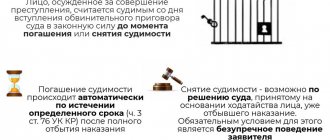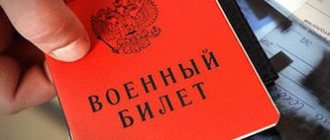○ What is a criminal record?
This concept is disclosed in the Criminal Code of the Russian Federation.
A person convicted of committing a crime is considered to have a criminal record from the day the court’s conviction enters into legal force until the criminal record is expunged or removed. A criminal record in accordance with this Code is taken into account in case of recidivism of crimes, imposition of punishment and entails other legal consequences in cases and in the manner established by federal laws (Clause 1 of Article 86 of the Criminal Code of the Russian Federation).
In accordance with this law, this is a temporary status of a citizen, which is assigned to him until the end of the probationary period appointed by the court. Despite the fact that many believe that a criminal record is a lifelong stigma, in fact, after expungement, it only affects public assessment.
Restrictions imposed by the court
What restrictions the court imposes on a convicted person who has received a suspended sentence are defined in paragraph 5 of Art. 73 of the Criminal Code of the Russian Federation. First of all, the court takes into account:
- age of the convicted person;
- his ability to work;
- health status.
Based on this information, the judge may impose one, more, or all of the following restrictions:
- Territorial . Restricts the movement of a convicted person within a locality, district, region or region by prohibiting changes in place of residence or registration.
- Labor . Mandatory employment and a ban on dismissal from permanent employment.
- Educational . The need for training and education, the prohibition on interrupting the educational process.
- Visiting entertainment venues . Prohibition on appearance in bars, restaurants, discos and other entertainment establishments.
- Recovery from alcoholism . Mandatory inpatient compulsory treatment.
- Recovery from drug addiction . Mandatory inpatient compulsory treatment.
- Recovery from substance abuse . Mandatory inpatient compulsory treatment.
- Cure from venereal diseases . Mandatory inpatient or outpatient treatment in a clinic.
If it is necessary to change the place of work, study or residence, the convicted person is obliged to inform about this and obtain permission from the criminal executive inspection that monitors his behavior.
In addition to the listed restrictions, the court has the right to oblige the conditionally convicted person to perform other duties that are appropriate in each specific case. It can be:
- caring for elderly parents;
- performing community service;
- ban on communication with friends;
- a ban on being outside the residential premises at the place of residence in the evening and at night;
- the need for daily notification of stay at the place of residence;
- obligation to compensate for damage caused, etc.
○ What is a suspended sentence and when is it assigned?
If, having imposed correctional labor, restrictions on military service, detention in a disciplinary military unit or imprisonment for a term of up to eight years, the court comes to the conclusion that it is possible to correct the convicted person without actually serving the sentence, it decides to consider the imposed punishment suspended (Clause 1 of Art. 73 of the Criminal Code of the Russian Federation).
Based on this law, a suspended sentence may be assigned if the court finds that the convicted person does not pose a real danger to society. In such a case, a probationary period is assigned, during which the defendant must prove his repentance. The probationary period is determined by clause 3 of Art. 73 of the Criminal Code of the Russian Federation, according to which it can be:
- from 3 months to 3 years, if imprisonment for a term of up to a year is provided;
- from six months to 5 years, if the court decided to deprive him of his liberty for a period of more than a year.
The probationary period begins from the moment the court decision enters into legal force.
When deciding to assign a suspended sentence, the court takes into account:
- nature of the crime;
- level of danger to society;
- presence/absence of previous criminal record;
- behavior during investigative measures and trial;
- Lifestyle;
- reviews from colleagues/classmates/classmates;
- official characteristics from the place of work/study;
- Family status;
- presence/absence of a minor child and other factors.
The appointment of a suspended sentence may be facilitated by the defendant’s repentance, recognition of his own guilt, attempts to eliminate the consequences of his illegal action and/or the damage caused.
The procedure for assigning a suspended sentence
Conditional sentencing is the right of the court, but only in the manner and in cases provided for by the Criminal Code of the Russian Federation. The basis for this is to establish the possibility of correcting a convicted person without applying real punishment.
The set of conditions under which a suspended sentence may be imposed:
- As a real punishment, the court decided to impose imprisonment for up to 8 years, correctional labor, restrictions on military service, or detention in a disciplinary unit.
- The convicted person is not subject to restrictions for probation, which are:
- committing a sexual offense against a minor (under 14 years of age);
- committing a crime under Part. 1 and 2 tbsp. 205.1, Art. 205.2, part 2 art. 205.4 (terrorism), part. 1-3 Article 206 (hostage taking), Art. 360 of the Criminal Code of the Russian Federation (attack on persons and organizations under international protection);
- committing a serious or especially serious crime during the probationary period of a previously assigned conditional sentence for any intentional crime;
- committing a serious or especially serious crime during the unserved part of the sentence for an intentional crime while on parole;
- dangerous/especially dangerous relapse.
- The nature and degree of danger of the crime committed, the identity of the convicted person, and the mitigating and aggravating circumstances available in the case allow the application of a conditional sentence (evaluation criterion).
As a rule, the court goes for a conditional sentence if there are no restrictions for this, and the convicted person has a positive character, has made amends for the cause of harm and has other mitigating circumstances. On the other hand, even one aggravating circumstance is enough to prevent the court from agreeing to this. In general, too many evaluative factors, and sometimes subjective assessments, underlie the court’s adoption of a particular decision. In the vast majority of cases, those defendants who face real imprisonment are fighting for a suspended sentence.
The decision on a suspended sentence is made by the court along with the decision of other issues when preparing a guilty verdict. It is included in the text of the sentence and announced along with it.
○ Is a suspended sentence a criminal record?
Probation is simply a form of punishment imposed by the court. Therefore, this is a criminal record, which, if you fail to comply with your obligations during the probationary period, can become real.
Despite the fact that a suspended conviction implies the possibility of being released, it imposes certain restrictions on the lifestyle of the convicted person until the end of the sentence. This:
- the obligation to notify the relevant authorities when changing the place of permanent residence, work or study;
- risk of reduction if he is military;
- lack of voting rights;
- the need for official employment;
- impossibility of traveling outside the country.
In the latter case, there may be exceptions if a close relative becomes seriously ill or dies. The decision to leave is made by the relevant authorities after submitting an official request indicating the destination, purpose of the trip and time of absence.
The behavior of the convicted person during the probationary period is controlled by:
- the criminal-executive inspection, if we are talking about a citizen;
- the command of the military unit, if the defendant is a military man.
In addition, having a suspended conviction makes it impossible to work in certain areas, such as:
- law enforcement and military forces;
- public service;
- education;
- advocacy;
- financial organizations (holding managerial positions is not allowed);
- aviation security;
- detective or security activities.
Thus, despite the fact that, according to the law, having a suspended criminal record should not be an obstacle to official employment, in practice, finding a job becomes significantly more difficult.
In addition, a probationer cannot:
- stand for election;
- obtain a weapons or hunting license;
- become a guardian or adopt a minor;
- obtain another citizenship.
All these restrictions are lifted after the expiration of the probationary period.
In addition to difficulties with employment, a suspended sentence involves other difficulties. Any violation of the law, including failure to comply with traffic rules, may be grounds for replacing the suspended sentence with a real one. Therefore, it is very important during the probationary period to exercise maximum caution and not come to the attention of legal officials.
Restrictions imposed by the legislation of the Russian Federation
Russian laws regarding a conditionally convicted person provide:
- a ban on the admission to the civil service and the presence in the civil service of suspended citizens;
- ban on working in the prosecutor's office;
- ban on traveling outside the Russian Federation;
- ban on service in law enforcement agencies and justice agencies;
- prohibition on engaging in teaching and educational activities;
- prohibition on obtaining a license to purchase weapons.
Item 2, part 1, art. 16 Federal Law No. 79 (as amended on December 16, 2019) “On the State Civil Service of the Russian Federation” says that a citizen of the Russian Federation cannot be accepted into the civil service, and a civil servant will not be allowed to be in this service if the judge has sentenced such a citizen to punishment , eliminating the possibility of fulfilling the duties provided for by the public service, and this sentence acquired legal force. This restriction applies to persons who have an outstanding or unexpunged criminal record.
Based on clause 2 of Art. 40.1 Federal Law No. 2202 (as amended 02/06/2020) “On the Prosecutor’s Office of the Russian Federation” a citizen of the Russian Federation cannot be hired to serve in the prosecutor’s office or cannot work in the prosecutor’s office if he has or has a criminal record. This also applies to citizens who have a criminal record with a suspended sentence.
Part 4 art. 15 Federal Law No. 114 (as amended on December 16, 2019) “On the procedure for leaving the Russian Federation and entering the Russian Federation” states that a citizen of the Russian Federation will be denied the registration of documents to travel outside of Russia if he :
- convicted of committing a crime;
- is serving a sentence;
- not exempt from punishment (has an outstanding criminal record).
This restriction applies to persons serving a real or suspended sentence.
For an employee of internal affairs bodies, clause 2, part 1, art. 14 Federal Law No. 342 (as amended on December 16, 2019) “On service in the internal affairs bodies of the Russian Federation” introduces restrictions on the performance of one’s official duties and a ban on service if:
- the court sentenced him in accordance with the sentence that received legal force;
- he has an expunged or expunged criminal record.
This restriction also applies to persons who have received a suspended sentence.
Item 2, part 1, art. 14 Federal Law No. 328 dated October 1, 2019 “On service in the compulsory enforcement bodies of the Russian Federation” states that an employee cannot serve in the bodies if :
- he received punishment in accordance with a legally binding court verdict;
- has an expunged or expunged criminal record.
The restriction also applies to citizens who have received a suspended sentence.
Art. 331 and 351.1 of the Labor Code of the Russian Federation (Federal Law No. 197, as amended on December 16, 2019) provide for a ban on engaging in teaching and educational activities for the following persons :
- deprived of this right, according to a legally binding court verdict;
- have or have a criminal record.
The restriction applies to citizens who have received a suspended sentence.
In accordance with paragraph 3 of Art. 52 of the Air Code, in order to protect the rights of citizens and the security of the state, it is prohibited to accept citizens with an outstanding or unexpunged criminal record into service as aviation personnel. This also applies to those who received a suspended sentence.
In accordance with paragraph 3 of Art. 13 Federal Law No. 150 (as amended on 08/02/2019) “On Weapons” , citizens of the Russian Federation who have committed an intentional crime and have an unexpunged or unexpunged conviction do not have the right to obtain permission to purchase weapons . This applies to those sentenced to a suspended sentence with a criminal record.
Amnesty in Russia in 2020
○ Expungement of a criminal record with a suspended sentence.
In accordance with the law, the end of a suspended sentence removes a criminal record from the offender and makes him “clean” before the law. However, this period of life will leave an imprint on the entire future fate, because, despite the expungement of a criminal record, information about the crime committed will be stored in the system of the Ministry of Internal Affairs. At the slightest violation of the law, they will be taken into account when determining the punishment. In addition, society at the present stage does not accept the fact that a criminal record has been expunged. If a citizen comes to the attention of the police and, moreover, receives a suspended sentence, this imprint will remain on him forever, causing public condemnation.
A criminal record under a suspended sentence is automatically removed after the end of the probationary period and in the future the citizen is considered to have no criminal record.
Thus, a suspended sentence is a real conviction, carrying the same consequences for the convicted person as imprisonment.
What is the difference between withdrawal and repayment?
Expungement of a criminal record is terminated automatically after the period established by law, which does not require a special court decision, also after the end of the probationary period and serving the sentence.
In accordance with Part 3 of Article 86 of the Criminal Code of the Russian Federation, expungement of conviction is granted to citizens:
- convicted with a suspended sentence at the end of the probationary period;
- convicted of a non-severe form of punishment, without deprivation of will, after a year of serving;
- convicted by deprivation of liberty for offenses of light or moderate severity, after three years;
- for those convicted of serious offenses - after serving the conviction for 6 years;
- for those convicted of particularly serious offenses, 8 years must pass after serving the sentence.
And when a suspended conviction is cancelled, is the person considered to have a criminal record? In agreement, it is not considered by law, but it is better to go through the process of removing the conviction early, which will be faster with a long period of repayment provided for by law.
For young people who have committed offenses when they were minors, the expungement of their criminal record is reduced in duration:
- For minor offenses – six months after serving the sentence.
- Light or moderate offense – 12 months.
- Serious and especially serious offenses – 3 years.
Release on parole by replacing the punishment with a more lenient one does not cancel the opportunity to expunge a criminal record that begins its calculation from the period of release from serving the main or additional punishment.
The following can contribute to the expungement of a suspended conviction:
- exemplary behavior of the convicted person during probation or other punishment;
- absence of any violations during this period.
They will be the main arguments in solving this problem. The abolition of a suspended sentence and the expungement of a criminal record are inherent in the justice authorities. And according to the law, a citizen is considered unconvicted and has not been subjected to legal punishment.
The removal of a suspended criminal record occurs by annulment, made by a special or special court decision:
- Amnesty (decriminalization), which is announced by the State Duma of the Russian Federation in relation to an unspecified circle of persons.
- A pardon that can be carried out by the President of the Russian Federation in relation to a certain person.
According to the current criminal law, it is possible to completely remove it by providing it as a criminal legal incentive to the convicted person for positive behavior. How long will it take for a suspended conviction to be lifted?
It happens that it is removed by the court:
- before the expiration of its repayment terms;
- with impeccable behavior of a person sentenced to probation or when half the term of serving the sentence has already passed;
- at the request of the convicted person.
The fact of a criminal record does not delight sensible people, but in life there are different situations when an adequate person, under the influence of external factors, commits an offense.
People who are faced with how to remove a suspended conviction should know that it is possible to remove it before the end of the probationary period, but with the following conditions:
- That the convicted are compensated for the harm caused for the crime committed.
- Exemplary behavior confirming that the convicted person has taken the path of reform.
An important point is to provide the court with the facts:
- characteristics;
- certificates
Proving the citizen’s service life and having the right to early expungement of a criminal record with a suspended sentence. A criminal record that is withdrawn or expunged removes the legal consequences associated with it.
○ Advice from a lawyer:
✔ I have 2 suspended suspended convictions, now there are no problems with work/the law, I have a son who wants to go to study at the police or the FSB, will they take him?
Hello. The law does not specify a ban on employment if there is an expunged criminal record, but these very structures that you listed check not only candidates, but also close relatives. And since you, being a father, belong to this category, it is quite possible that having a criminal record will affect your ability to get a job.
When a minor can be given a suspended sentence
Lawyer Antonov A.P.
A convicted minor may be given a suspended sentence with an appropriate probationary period, during which he must prove his correction. The use of probation for minors is limited to the imposition of such types of punishment as correctional labor and imprisonment. According to paragraph 29 of the RF PPVS dated 02/01/2011, when imposing a sentence on a minor using the provisions of Article 73 of the Criminal Code of the Russian Federation, the courts must discuss the issue of imposing specific responsibilities provided for by law on the conditionally convicted person. Control over the behavior of suspended minors in accordance with Part 1 of Art. 187 of the Penal Code of the Russian Federation is carried out by the Penal Inspectorate, which, in accordance with Part 2 of Art. 187 of the Penal Code of the Russian Federation may, in the manner prescribed by the legislation of the Russian Federation and regulatory legal acts, involve employees of the juvenile affairs departments of the internal affairs bodies (hereinafter referred to as the PDN) in monitoring the behavior of the specified category of minors. Together with the PDN, they monitor the behavior of minors subjected to educational or administrative measures, those sentenced to non-custodial sentences, those on probation and early release from serving their sentences, the behavior of minors who have returned from special educational and treatment institutions or those who have served their sentences in educational labor colonies, monitor the behavior of convicts in respect of whom the execution of a sentence of imprisonment has been deferred, and the Commission for the Affairs of Minors and the Protection of Their Rights (hereinafter referred to as the KDNZP) also keeps records of these minors. Commissions, if necessary, take measures to employ minors or send them to educational institutions. It is necessary to pay attention to the specifics of resolving the issue of extending and canceling probation for minors. So, according to Part 2 of Art. 74 of the Criminal Code of the Russian Federation, if a conditionally convicted person has evaded the performance of the duties assigned to him by the court or committed a violation of public order for which he was brought to administrative responsibility, the court, upon the proposal of the Penal Inspectorate, may extend the probationary period, but not more than for one year. In accordance with Part 3 of Art. 74 of the Criminal Code of the Russian Federation, if a conditionally convicted person systematically violated public order during the probationary period, for which he was brought to administrative responsibility, systematically failed to fulfill the duties assigned to him by the court, or escaped from control, the court, upon the proposal of the Penal Inspectorate, may make a decision to revoke the conditional conviction and execution punishment imposed by a court verdict. However, according to Part 1 of Art. 2.3 of the Code of Administrative Offenses of the Russian Federation, a person who has reached the age of 16 at the time of committing an administrative offense is subject to administrative liability. Administrative penalties for violating public order cannot be applied to persons under 16 years of age. Consequently, in such a situation it is impossible to talk about either extending or canceling the suspended sentence. In addition, taking into account the specific circumstances of the case and data about the person who committed an administrative offense at the age of 16 to 18 years, the KDNZP, this person may be released from administrative liability by applying to him a measure of influence provided for by the federal legislation on the protection of the rights of minors (Part. 2 Article 2.3 of the Code of Administrative Offenses of the Russian Federation). If a juvenile convict who has been given a conditional sentence has committed a new crime during the probationary period, belonging to any category, with the exception of a particularly serious one, the court, taking into account the circumstances of the case and the identity of the perpetrator, may, in accordance with Part 6.2 of Art. 88 of the Criminal Code of the Russian Federation, re-decide on a suspended sentence, establishing a new probationary period and imposing on the suspended sentenced person the fulfillment of certain duties provided for in Part 5 of Art. 73 of the Criminal Code of the Russian Federation. The possibility of a second conditional sentence in the event of committing a crime of any category, with the exception of a particularly serious one, is not an obligation, but a right of the court. Taking into account the identity of the perpetrator and the circumstances of the case, the court may not take advantage of the opportunities offered by the legislator and impose a punishment according to the rules of Art. 70 of the Criminal Code of the Russian Federation with its actual serving. At the same time, in accordance with Part 6.2 of Art. 88 of the Criminal Code of the Russian Federation, if a conditionally convicted minor commits a new crime that is classified as especially serious, the court revokes the conditional sentence and imposes punishment according to the rules of Art. 70 of the Criminal Code of the Russian Federation. If a minor is given a suspended sentence, in addition to the duties that may be assigned to him in the manner provided for in Part 5 of Art. 73 of the Criminal Code of the Russian Federation, the court, in accordance with the Federal Law of June 24, 1999 “On the Basics of the System for the Prevention of Neglect and Juvenile Delinquency,” if there are grounds for this, has the right to oblige the convicted person to undergo a course of social and pedagogical rehabilitation (psychological and pedagogical correction) in educational institutions, providing pedagogical and psychological assistance to minors with disabilities. In accordance with this Law, imposing on a minor the obligation to return to an educational institution to continue studying is possible only if there is a conclusion from the psychological, medical and pedagogical commission of the governing body. When deciding on a suspended sentence for a minor for a new crime that is not particularly serious, it should be borne in mind that in accordance with Part 6.2 of Art. 88 of the Criminal Code of the Russian Federation, the probationary period for each of the sentences is calculated independently within the framework of the established sentences, which are also executed independently. The duration of the probationary period for a convicted minor is determined in the minimum amount necessary to achieve the goals of the punishment. The probationary period and the list of responsibilities imposed by the court on a suspended minor are established taking into account the objectives of his correction and should not be associated with restrictions on his rights not provided for by law. In exceptional cases, the court has the right to apply the rules on sentencing to minors and to persons who committed crimes between the ages of 18 and 20 (Article 96 of the Criminal Code of the Russian Federation). Such a decision must be motivated in the verdict by the presence of exceptional circumstances characterizing the act committed by the person and his personality (clause 29 of the Russian Federation PPVS dated 02/01/2011).
Still have questions for your lawyer?
Ask them right now here, or call us by phone in Moscow +7 (499) 288-34-32 or in Samara +7 (846) 212-99-71 (24 hours a day), or come to our office for a consultation (by pre-registration)!











